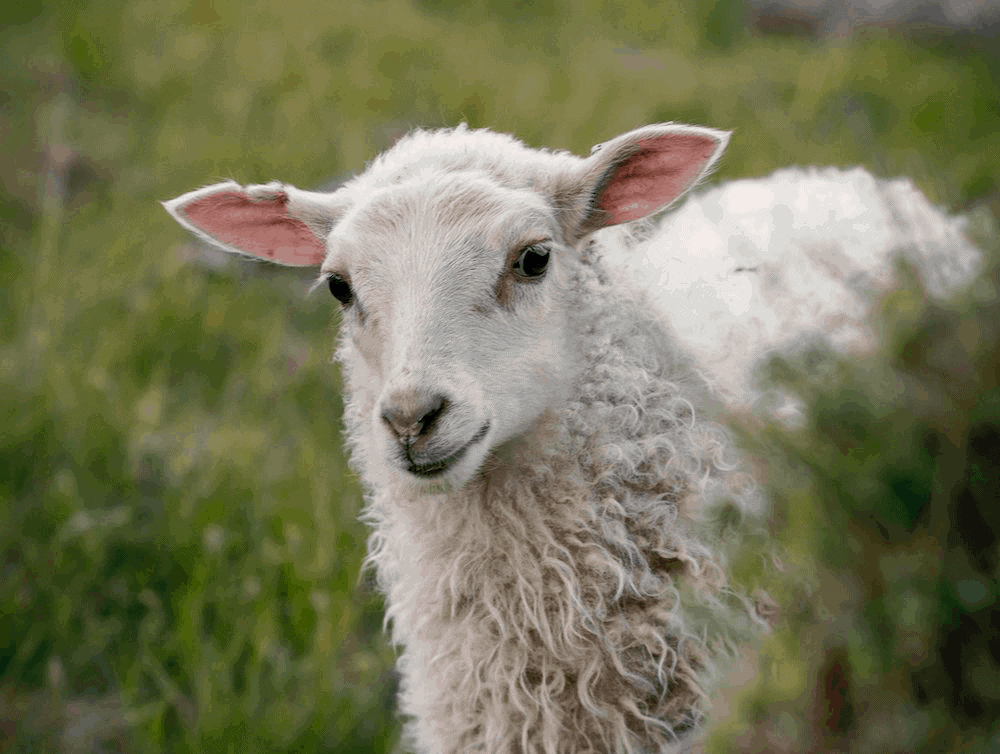
If you spend much time on sanctuary grounds, you likely know that residents have complex and fascinating personalities and quirks. Because many folks have likely never met individuals living out their lives in sanctuary before, we have created a series of resources compiling fun and fascinating facts about residents to share with supporters and the general public. Sheep are amazing beings who deserve to be better known!
10 Fun Facts About Sheep
- Did you know that sheep are excellent at recognizing and distinguishing between faces? In one study, scientists had sheep distinguish between the faces of celebrities such as Barack Obama, Emma Watson, and Jake Gyllenhaal! Many were able to still recognize the face after the picture had been altered or they were shown a different angle.
- Sheep have a great sense of smell, and have special scent glands located in front of their eyes and between the digits of their hooves to help them out! Mothers learn to identify their babies by their unique scent.
- Sheep also have a great sense of taste, and can even use this sense to discriminate between plants and substances for the purpose of self-medication! This is an example of a behavior called Zoopharmacognosy, where non-human animals seek out plants, insects, certain types of soil and other things to medicate themselves for ailments like stomach upset and high parasite loads!
- What about sight? Sheep have amazing peripheral vision. Their field of vision is nearly 360 degrees! They cannot see directly behind them, but otherwise have a very impressive visual range, especially when their head is lowered to graze!
- Sheep have a nifty little split in their upper lip to help them choose the plants they consume! You know what they don’t have though? Front teeth in their upper jaw!
- Sheep memories are also pretty great. They can recognize up to 50 sheep faces and remember them for two years!
- Turn that frown upside down! Sheep can distinguish between a smile and a frown on human faces, and prefer smiles much like us.
- Sheep are quite clever! They can navigate mazes and have been found to use their excellent memory to memorize how to get through them quickly!
- Not only do sheep form friendships, it appears they have some capacity for forming mental images of the faces of other individuals. We don’t know to what extent they experience this but, for humans, it would be similar to thinking about a good friend you are missing and picturing their face.
- Sheep can see violet, blue, cyan, green, yellow, and orange. While they technically have the ability to see a little bit of red, they are red-green colorblind, so can’t distinguish between those colors.
Hopefully this gives you and your visitors a better idea about the complex and fascinating lives of sheep. Did you find any of these fun facts surprising? Or would you like to see a verified fun sheep fact added to this list? Let us know!
SOURCES:
The Secret Lives Of Sheep | Animals Australia
10 Facts About Sheep | Four Paws
Meet The Animals: Sheep And Goats | Farm Sanctuary
Sheep Can Recognise Celebrity Faces From Photos Alone | Science Alert (Non-Compassionate Source)
Face Pictures Reduce Behavioural, Autonomic, Endocrine And Neural Indices Of Stress And Fear In Sheep | The Royal Society (Non-Compassionate Source)
What Is The Difference Between A Sheep Eye And A Human Eye? | Reference (Non-Compassionate Source)
Goats/Sheep | Evergreen College (Non-Compassionate Source)
Sheep Senses, Social Cognition And Capacity For Consciousness | The Welfare Of Sheep (Non-Compassionate Source)
Sheep Like Smiles Say Researchers | BBC News (Non-Compassionate Source)
Amazing Powers Of Sheep | BBC News (Non-Compassionate Source)
If a source includes the (Non-Compassionate Source) tag, it means that we do not endorse that particular source’s views about animals, even if some of their insights are valuable from a care perspective. See a more detailed explanation here.








